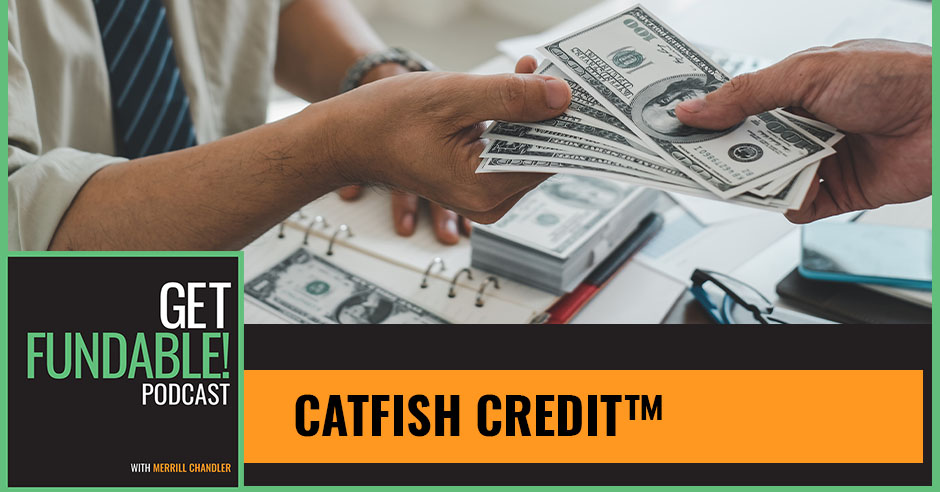
As a business owner or a simple professional, you want to minimize cost in any way possible. You also want to accumulate rewards with every expense. That’s why credit offers that are way too beautiful would sound great. But, you have to be careful. Not everything is real. How do lenders catfish you into a deceptive relationship? Let’s dive into this episode as we discuss the three deceptive practices of credit offers that are designed to manipulate those who are seeking business credit into beginning a relationship based on deceptive or false premises.
—
Watch the episode here
Listen to the podcast here
Catfish Credit™
I’m so excited because I have been talking about business credit posers and operators out there who have gray lines between, business and personal credit. I call this whole environment, and we are going to be talking in this episode about catfish credit. What catfish credit means? How somebody is posing something else to build a deceptive relationship with you. We are going to be talking about how to not get catfished when you are looking for business credit.
—
Just like you read in the introduction, catfish credit. Are you kidding me? You know what catfishing is. Catfishing is when someone uses an online presence or an identity, and they use it for the purpose of beginning a deceptive relationship. It’s usually in the dating world or relationship building. Somebody puts up a better-looking picture than they actually are and they start building a relationship with someone. That’s called catfishing.
That exact same behavior is also happening in the business credit world. The business credit universe has people who are catfishing you for credit. We have used the term business credit posers before but let’s think of it as catfish credit. I love this definition. Credit offers are designed to manipulate someone who is seeking business credit into beginning a relationship based on deceptive or false premises.
Lenders
Credit offers are designed to manipulate you who are seeking business credit into beginning a relationship based on a deceptive or false premises. Let’s take a look at some of these deceptive practices. There are three different groups that we are going to take a look at. The first are lenders. How do lenders catfish you into a deceptive relationship?
Catfish credit deception number one is when lenders offer business credit to unsuspecting borrowers and then report the balances monthly to your personal profile. If you have read my Bootcamp and previous episodes of my show, this is horrendous. Who are examples of using this practice? Capital One, reports its balances to your personal. Discover it card, which is a business card. Discover it reports monthly balances to your personal profile.

Catfish Credit: Cat fishing is when someone uses an online presence or an identity, and they use it for the purpose of beginning a deceptive relationship. That exact same behavior is also happening in the business credit world.
Elan Financial, Synchrony Bank, WebBank, and there are others. Many tier-three community banks or credit unions. They will say it’s a business credit profile and will then report your balances of a credit line, credit card or otherwise to your personal profile. That is a deceptive practice. We think we are getting it for our business and yet, it’s harming the balances and the utilization of our personal profile.
That is catfish credit example number one. The negatives are the balances report to your personal. When you are being a good businessman, businesswoman, and entrepreneur, and you are putting balances on these credit cards not knowing that it’s harming your personal profile, that negatively impacts your personal profile score. That negatively impacts your fundability, and most importantly, these different operators or lenders give you no opportunity to leverage your relationship to have a deeper, more meaningful relationship.
What I mean by that is because there’s a credit card, none of these operators offer a credit line, business loans, etc. That’s our goal, fundability. Especially for us, entrepreneurs and real estate investors, fundability is about getting all the business credit that doesn’t report to our personal. That’s catfish credit deception number one.
One of the telltale signs of what to watch for is if any lender avoids answering this question, do these credit accounts report monthly to my personal credit profile? If they hem and haw to that question, if they say they do or if they don’t know the answer, you need to get 3 of the same answer from 3 different people, whether it’s yes or no, it’s got to be 3 different answers or 3 of the same answer. We need to know whether or not they are reporting to your personal profile before you engage that particular credit instrument.
Credit Card Stackers
Let’s look at deceptive practice number two. Credit card stackers. Credit card stacking is when a business implies they can help you “get credit for your business or get financing for your business.” If you hear them say those types of things, they are not saying, “We are going to get you business lines of credit or business loans.” They are likely going to get you personal credit cards that ruin your personal fundability whenever they are used. That’s what credit card stacking is. One of the most horrible versions of that was seed capital.
Catfish credits are credit offers designed to manipulate people to build relationships based on deceptive or false premises. Share on X
They were shut down and fined by the FTC for fraudulent business practices because they use the language, “Help you get credit for your business or get financing for your business.” Be careful of what you are looking for. What to watch out for you is the same thing I asked before. Do any of these credit accounts report monthly to my personal credit profile?
If they don’t answer that clearly with a, “No, they don’t,” and you get that same answer 3 times from 3 different people, run. Do not work with that outfit. The negative impact since personal credit cards that are being used for your business are being reported monthly to your personal profile is negatively impacting your profile, your score, and your fundability. Since they are not true business credit cards, credit lines, business loans or commercial loans, you are not building a relationship with any of these banks. All bad juju.
Credit Builders
The last deceptive practice is with “business credit builders.” What is the catfish credit version of this? When a business credit builder says that they can help get credit for your business with no personal guarantee but somewhere in there, they are implying that some of their credit approvals will be bank cash equivalent business loans or lines of credit.
Many people are deceptive about this. These operators on one line will say, “No credit with your EIN and get a credit line without your EIN.” What they are referring to are FinTechs, cabbages or SoFi loans that may not report to your personal profile but are high cost. They could be 27% or 36% per year in financing.
Technically, they are a credit line but they are not the bank cash equivalent. They are not a Chase, Wells, PNC, BB&T. That’s somewhere between 4% and 5% interest. Watch what the implication is. If they say, “We can get you credit lines.” Ask them, “Are these national bank credit lines? What types of credit lines are they?”

Catfish Credit: Another deception is when a business credit builder says that they can help get credit for your business with no personal guarantee, but somewhere in there they’re implying that some of their credit approvals will be bank cash, equivalent business loans.
If you do not hear top-tier bank credit lines, not credit cards, if you do not hear bank cash equivalent, meaning you could use it as cash. It’s not a credit line, Uline or Grainger, one of these supply stores or industrial supply. When you ask these questions and they say, “Yes, we can help you get business loans and lines of credit from top tier banks as low as 4% to 5% interest,” keep talking to them. I believe we are the only game in town that does that but most of these business credit builders want to help you get business credit but the business credit isn’t going to be non-PG. You have to personally guarantee every cash account that you take out for these top-tier credit cards, credit lines, and business loans.
Things to watch out for is that there are groups out there like eCredable. To build business credit, eCredable is getting you vendor credit and reporting your utility, internet, and cell phone bill. We say that on the personal side. Is Chase going to give you a $50,000 or $100,000 business line of credit based on your Home Depot reputation?
Are they going to use your utility bill to help qualify? No. Are they going to use your internet provider service? No, they are not. They are going to look for like-kind lending. They want to see top-tier business credit accounts to see how you perform in top-tier business credit accounts. Another one to watch for Dun & Bradstreet offers a service that’s called a Business CreditBuilder™ Plus.
You would want to be careful because they are only building a business credit score and that business credit score is on the personal side. What is that business credit score based on? What’s the quality of the accounts in the profile? If they are little vendor or trade accounts, it’s not going to help you get approved from Chase, Wells or any of the top tier 1 or 2 accounts.
I’m saying here is they are going to lend to lenders that are on your business credit profile that they trust, not the little warehouse accounts and things like that. Another example is NAB.com does the same thing. You want to make sure that you are building credit with credible accounts. Accounts that cash lenders like top tier banks, those credit lines, business loans or business credit cards are looking for high-valued, distinguished accounts. Not little merchant, vendor, or retail accounts.
When business credit builders say they can get credit for your business with no personal guarantee, you have to take a pause and find someone who would show you differently. Share on X
When business credit builders say they can get credit for your business with no personal guarantee, I’m telling you to my awareness, I would love somebody to show me differently. Since 2008, I have not seen cash credit cards, meaning top tier bank credit cards that you can use like cash, business credit lines, and loans from top tier banks, without a personal guarantee.
I haven’t seen it since 2008. If you know of anybody, please get in contact with me. I would love to see how to expand this because I don’t want to downplay people who are succeeding at getting real live business credit from top-tier banks. Unsecured, but these cash equivalent lines are all going to be personally guaranteed.
They are not going to say it outright. They are going to imply, “We can get you credit lines that don’t report to your personal.” It’s not going to be a bank, tier 1 and 2 banks, credit lines, credit cards, and loans. That means they are implying something else. Ask the questions. Vet those banks until you have the truth from three different people. What you need to watch out for is if anyone mentions the phrase, “Build business credit.” That’s when you got to start. You’ve got to watch out. You have to watch out because you might be headed for danger unless you ask these important questions as we have reviewed them here.
There are three different categories of business credit. There’s merchandise credit, which is these low-value trade lines, vendor lines, and things like that. There’s commercial credit, and by and large, the vast majority of commercial credit has nothing to do with your personal credit but it also requires $3 million in annual revenue and a $1 million request for funding. They won’t do anything under $1 million.
Where get fundable and credit sense, where we focus is small business credit. Business credit cards, credit lines, and loans that are personally guaranteed by you but are unsecured. The vast majority of them are stated income, meaning it’s a single application like a credit card. You can use them like cash equivalents and are top tier but require a personal guarantee.
I love these deep dives. Like, love, and share. Send this to somebody that you know or who needs to be able to cross the T’s and dot the I’s so that they know the questions to ask these operators. I’m not here to disparage anybody. I want you to know the truth, and I want you to be able to have the power to ask the right questions, so you know what you are getting into. I will see you in the next episode.




